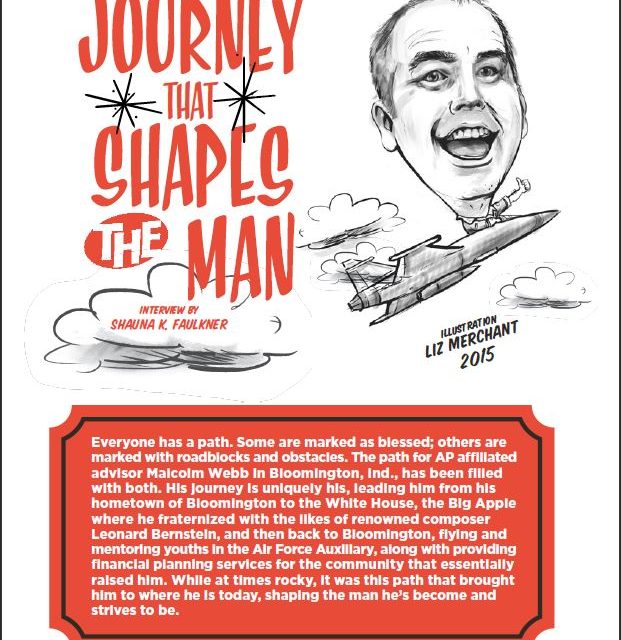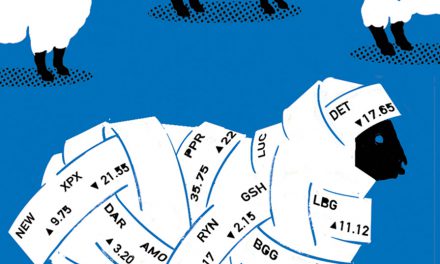
FREE 9.3 Q&A -Malcom Webb
Everyone has a path. Some are marked as blessed; others are marked with roadblocks and obstacles. The path for AP affiliated advisor Malcolm Webb in Bloomington, Ind., has been filled with both. His journey is uniquely his, leading him from his hometown of Bloomington to the White House, the Big Apple where he fraternized with the likes of renowned composer Leonard Bernstein, and then back to Bloomington, flying and mentoring youths in the Air Force Auxiliary, along with providing financial planning services for the community that essentially raised him. While at times rocky, it was this path that brought him to where he is today, shaping the man he’s become and strives to be.
To view the full article please register below:
FREE 9.3 Q&A -Malcom Webb
It’s the journey that shapes the man.
Everyone has a path. Some are marked as blessed; others are marked with roadblocks and obstacles. The path for AP affiliated advisor Malcolm Webb in Bloomington, Ind., has been filled with both. His journey is uniquely his, leading him from his hometown of Bloomington to the White House, the Big Apple where he fraternized with the likes of renowned composer Leonard Bernstein, and then back to Bloomington, flying and mentoring youths in the Air Force Auxiliary, along with providing financial planning services for the community that essentially raised him. While at times rocky, it was this path that brought him to where he is today, shaping the man he’s become and strives to be.
FREE: You’ve led quite an eclectic career, including interning at the White House during the Reagan administration and in the United States Senate. Were you interested at the time in a career in politics?
MALCOLM WEBB: Actually, I wasn’t interested in that career path at all. It came about as a result of a trip to Washington, D.C., that I went on with a family friend. It was an incredible trip and I experienced so much, even dinner with the President and talking to Peter Jennings. For a kid fresh out of Indiana—I was in my first year at Indiana University, majoring in economics—it was a big deal. A staffer for Congressman John Myers suggested I come out for an internship, so I went for it.
FREE: So what led you into financial services?
MW: Another close friend of my father’s, who is president of The Julliard School, was out visiting dad, who was Dean of the Indiana University School of Music. At dinner one night, he asked if I would like him to help set up some interviews in New York. This is in my senior year, so I jumped at the chance. I wasn’t sure that New York was where I wanted to be, but I knew I needed help getting interviews. A few days later, I started getting voicemails on my fraternity room answering machine from someone named Ralph Leach. I was lazy in returning the calls until one night, after missing a second call from him, I decided to look him up; when I did, I discovered that he was the retired chairman of JP Morgan! You can imagine I decided I needed to call him back right away. He was the nicest fellow, and set up an interview for me with JP Morgan. Well, I bombed that one, and then he set up an interview for me at U.S. Trust. When I got the call from HR at U.S. Trust, they asked
when I could come out for an interview. Mindful of my lazy attitude with the past opportunity, I asked my roommate if he wanted to take a trip to New York … that night. He said, “Let’s do it!” He even took most of the driving that night so I could rest. When I walked into that interview, the first question was, “How was your flight?” When I answered, “Actually, I drove,” I think I landed the job right then. An offer was extended to me that afternoon, and later that summer I became one of two assistants for a group of five investment managers that made up the largest investment office at U.S. Trust. We ran $2 billion of wealth between those five managers.
FREE: Where did you go after leaving U.S. Trust?
MW: I decided to return back to Indiana and pursue a law degree as I was still interested in politics. I had an offer to work as a paralegal for my brother, a lawyer in Indianapolis; but, after working for him and my sister-in-law, who is also an attorney, I realized I felt absolutely no calling for the law. I did still have an interest in politics, though, and was fortunate to receive an offer by the General Counsel of the Hoosier State Press Association. I worked as a lobbyist during that legislative session, and the following year as well. From there, I went on to work in government relations for Indiana University for six years.
FREE: After the political scene, what led you back to this career path of financial services that has now spanned nearly 20 years?
MW: It was the realization that I had a passion for improving people’s lives through the power of compound interest and through good money management. Another thing was that I saw a relationship between politics and money that made me uncomfortable. As it turns out, my predecessor in the job I had at Indiana University had a son who was a broker for Hilliard Lyons. She introduced the two of us, and he invited me to go to work for them.
FREE: And the rest is history?
MW: Oh, no. It was largely a disaster! I can’t sell my way out of a paper bag! For me, it was coming to grips with the reality of prospecting. If you’re going to build a business, you have to do prospecting somehow, but it absolutely terrified me; I don’t handle rejection well. That’s why most people with my personality don’t make it in this business.
FREE: But you stuck it out.
MW: I did. I had almost five years with Hilliard Lyons, but that was a really tough time in my life. I was good at picking stocks and mutual funds, and managing the money and client relationships once I had them. But, I was terrible at prospecting and closing deals. At that time, the world was just starting to switch to fee-based. I’m part of a generation that’s particularly suspicious of any sales process, and so the commission model made me uncomfortable; I was much more comfortable with a fee-based model where I was being compensated for providing advice and managing money, rather than selling products. It was a lean, rough road, though, and this reflected in my personal life, as my marriage deteriorated beyond repair. I certainly can’t recommend my specific path to anyone. However, when I looked at the numbers, I knew that time was on my side in that revenues would eventually surpass the fixed expenses. And that is what happened.
FREE: Was it after your stint with Hilliard Lyons that you decided to go independent?
MW: I went independent with MassMutual around 2003, but encountered a big problem with them in that their Series 65 business was being run on a system called FILOC (fee in lieu of commissions). On their model, we were charging clients 1 percent of the assets under management on a quarterly basis that we were running through the broker/dealer, not a registered investment advisor. Well, the Merrill Lynch Ruling basically blew that whole world apart, just as I was gaining traction in independence. MassMutual’s compliance department came up with a novel way of solving it—they would just quit paying any commissions that were being earned that way. So, in one quarter, all of the fee-based business that I had been building up for six years was about to be terminated! It was then that I began talking with [AP advisor, OSJ and AP Advisor Council chairman] Wayne Schuman, whose office was four flights up from me. Until then, we had been friendly competitors. I walked into his office and laid out the
impending doom facing me.
FREE: What advice did he have for you at that time?
MW: He was sympathetic about the situation and asked for time to make a few phone calls. A few hours later, he called me back up to his office, where he had set up a conference call with [COO] Dean Bruno, [VP and Senior Compliance Officer] Martin Wendel and [SVP and Chief Advisory Compliance Officer] Tom LoManto. They laid out how I could continue to manage money with American Portfolios Advisors, Inc. (APA).
FREE: Did you decide to make the leap to American Portfolios at that time?
MW: It appealed to me, but I was so suspicious of the industry at this point that I wasn’t completely sold on the idea, because my trust in everything and everybody was pretty well shot. I was disgusted with the entire industry. And, I didn’t know these guys; all I heard were New York accents [laughs]. I’d just been through a world where I was told I could do certain things, only to be told the opposite once I’d signed. However, I joined American Portfolios shortly after, and the deciding factor for me, ultimately, came down to Wayne. I didn’t trust anyone else, but I trusted Wayne. I had the attitude where I was just waiting for the other shoe to drop, that everything would be fine until I signed, and only then would I get to find out what the problems really were. But that’s not what happened at all. Instead, coming to American Portfolios ended up being, by far, the best move, career-wise, I ever made.
FREE: You continue to have a close relationship with Wayne, with an office just down the hall from his, correct?
MW: We jokingly say that I’m down the hall just far enough not to affect property values [laughs]. But yes, it’s a deep, abiding friendship. I have told Wayne on more than one occasion, “If you ever sell your practice, then please package me in with that sale, because I don’t want to do this with anyone else.” More than that, he serves as the best OSJ that anyone could ever hope to have. It’s a wonderful thing to have someone by your side who knows more than anybody I know, outside of AP’s compliance department, about the regulatory environment. But to have a supervisor who cares deeply about you, as well? That’s heaven. Really, the whole Schuman family is like my family, but sane. Wayne’s wife, Maggi, and their son, John, are a great help to me in business. I really can’t overstate how important they all are to me.
FREE: What is your business mix? Are you exclusively fee-based?
MW: No. Interestingly enough, I’ve sort of gone back recently in the other direction for some of my new clients because I am uncomfortable with a 1 percent fee for people who are in the early accumulation phase of life. It comes down to what’s best for the client within a range of what’s also fair to the advisor. At minimum, they’d have to have a large enough portfolio, where not only can they afford it, but they have complexity. The fact is, in Bloomington, many accumulators are just making regular payments into a mutual fund inside some kind of retirement plan, which is easy enough to set up and automate, and doesn’t require the kind of management that justifies the 1 percent annual charge.
FREE: Tell us about the ad campaign you ran to attract new customers.
MW: Advertising is notoriously poor in terms of results for our industry. The purpose of these ads was not to generate new business as much as it was to stimulate referrals. I ran a series of magazine ads in a beautiful publication called “Bloom,” where I decided to do a riff on the Dewar’s Scotch Profiles ads of the 1970s; they would take a celebrity and ask five questions, finishing with the Dewar’s high-quality trademark brand and clear implication that this was their scotch of choice. I knew people were reading the magazine and I knew my clients were also reading it, so I did profiles of my clients. The ads generated additional referrals from clients and from local attorneys. Once they saw full-page ads, that was proof enough for them that I’d made it. They started sending people my way.
FREE: Surely professional references can have a big impact?
MW: Absolutely. But the thing is, I care about my clients, and I think that resonates with them. My business comes almost entirely by word of mouth now. From talking with local attorneys, I’m almost always on a list of advisors that have been handed to a client needing help, and sometimes I’m the only name given. They know I’ll handle what the client needs, and I do take care of those clients; even more, in turn, they take care of me.
FREE: It sounds like you have a great relationship with your clients. What plan do you have in place to retain them and their successive generations?
MW: Honestly, I’m not overly concerned about that; either I’m going to have that business or not. I definitely am building the relationships, though, but based on the need to be able to manage the client’s financial needs at difficult times. That’s what is most important. It’s like my own plan for my business. I don’t have a formal plan in place because my children are too young to make a decision to go into business with me. But, as an immediate succession plan, it’s set that Wayne simply takes it over, and the clients know that if I auger my plane into the ground in the next five years, that’s what will happen. Since my children are currently sufficiently provided for in my estate, the main concern for the business is that the clients are taken care of.
FREE: You mention flying. Can you tell us more about that?
MW: I’ve been interested in flying all of my life; it was a dream of mine. I’m now part of the Air Force Auxiliary here, called the Civil Air Patrol, where I am a search and rescue, and disasterrelief mission pilot for them. We are the primary resource when any aircraft goes missing or the black box starts pinging—which happens more often than people realize. But in the process of joining the Civil Air Patrol, I discovered a passion in working with youth through their aerospace education and cadet programs, where they learn about physics and the basic principles of flight under a specific curriculum that’s been designed by the Air Force. Under that curriculum, I provide cadet orientation rides, where we’ll take the kids up to an altitude of about 3,000 feet, then turn the plane over to them and have them fly it. It is thrilling, and you cannot wipe the smiles off their faces when they’ve landed.
FREE: Flying rescue missions, interning at the White House … you’ve led quite a life! Am I correct in that you’ve even had a song written about you by renowned composer Leonard Bernstein, who composed the music for “Candide,” “West Side Story” and more?
MW: Bloomington is a wonderful town. It’s kind of a magical place in that it’s small enough that people know each other, but large enough to have wonderful amenities, particularly with the university, so there’s an incredible amount of culture here that we’re fortunate to have. And yes, through my father, our family had a friendship with Leonard Bernstein. He was a largerthan- life personality. When he entered the room, he took it over. But it’s funny because, when he first came around, I wasn’t aware of who he was.
FREE: When did you learn of his prominence?
MW: When I asked my dad who Leonard Bernstein was after a brief meeting, and I saw his horribly-pained expression, I knew he was really important. We kept up a friendship that remained until his death; I even attended his last public performance. I do have a funny story about him. While at U.S. Trust, I had some fraternity brothers come to visit, and I arranged for tickets to see Leonard Bernstein conduct at the New York Philharmonic, where afterwards we went backstage to visit with him. When he saw us, he turned to a woman next to him, grabbed me and said, “This is Malcolm Webb!” He had just published a song called “Mr. and Mrs. Webb Say Goodnight,” where most of the lyrics of the song are dialogue between my parents. It turns out that Mr. Bernstein’s companion was the singer who had just recorded my mother’s partand she hadn’t realized that the characters were drawn from a real family. It was a great night, complete with drinking whiskey with Leonard Bernstein and even ringing the bell on Yoko
Ono’s door at 5 a.m.!
FREE: You’ve accomplished and experienced so much in your life already! Who would you say has been your greatest inspiration?
MW: I can’t point to one person. Wayne is certainly up there with his encyclopedic knowledge of the industry, especially the regulatory environment. Maggi’s an inspiration in trying to keep me on task. Lon is on the list; the financial statements of the company show that he has followed his philosophy of seeking balance in the interests of the owners, the employees and the customers of American Portfolios. My father is certainly an inspiration. Honestly, I’m even inspired by movie characters as much as I am people in my life. I draw from so many sources.
FREE: You speak of the kind of person you want to be in the future. Both personally and professionally, what do you see for yourself in the future?
MW: I used to focus very much on the future, but I do so less and less these days. That’s just a personal philosophy; I think life needs to be lived in the present. That doesn’t mean we don’t plan. After all, I’m a financial planner, I have to look at the future. Changes will come with the industry and, with Wayne’s help, I will adapt to them. I do occasionally think of fully retiring, but the idea of sailing on a yacht doesn’t motivate me at all. Being active and doing something, flying for the Civil Air Patrol, that motivates me. Through them, I’ve gotten to be involved and make a difference in peoples’ lives. It’s pretty wonderful. Basically, right now, I’m focusing on what’s happening in my own kids’ lives and other kids’ lives, and hoping to make a difference. That’s it. The rest will come.
FREE: What a wonderful philosophy. Thanks so much for the insight into your life, Malcolm.
MW: Absolutely. Thank you.












